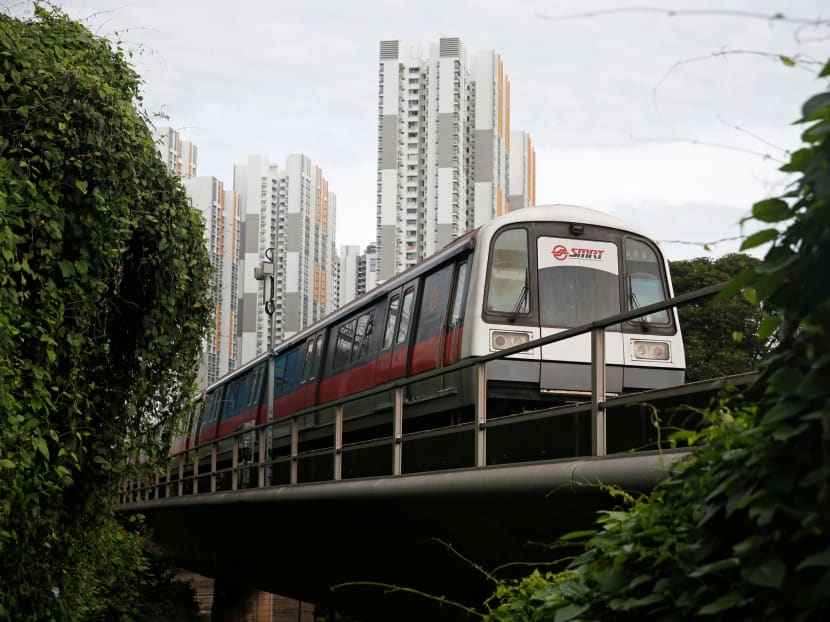Temasek offers to take SMRT private for S$1.18b to give transport operator more flexibility
SINGAPORE — In a widely expected move, Temasek Holdings — the Republic’s investment firm — on Wednesday (July 20) offered to take listed SMRT private to allow the public transport operator to focus on its primary role and free it from costs and distractions linked to listing requirements.
SINGAPORE — In a widely expected move, Temasek Holdings — the Republic’s investment firm — on Wednesday (July 20) offered to take listed SMRT private to allow the public transport operator to focus on its primary role and free it from costs and distractions linked to listing requirements.
Belfort Holdings — a wholly-owned subsidiary of Temasek — proposed to acquire the 46 per cent of SMRT not owned by Temasek at S$1.68 per share or a total of around S$1.18 billion for 702 million shares under a scheme of arrangement. The offer values SMRT at S$2.57 billion.
SMRT will be wholly-owned by Temasek when the acquisition is completed and will be delisted from the Singapore Exchange.
SMRT shares last traded at S$1.545 before being suspended on Friday. On Friday, SMRT announced that it would be selling its operating assets to the Land Transport Authority (LTA). The shares — which remained suspended until Wednesday as reports of a Temasek buyout of SMRT emerged – are due to resume trading Thursday.
Temasek and SMRT are expected to apply to the court for a shareholders meeting around end-August this year, with the meeting itself expected in September or October. Assuming shareholder approval, the offer is expected to become effective in October or November.
“We are proposing to move SMRT to private ownership so we can more closely collaborate with the company on system level transformation, including its transition to the new regulatory environment without the distraction of being a listed company,” Mr Chia Song Hwee, president of Temasek International, said in a statement.
At a subsequent briefing, Mr Chia explained “There could be near term pressure on bottom line .. Plans are in place to improve the productivity and service quality - the key objective is to let the company focus on its core operations without bothering about the various issues around a listed company.”
He added that Temasek does not see the proposed move as a nationalisation initiative, adding that SMRT will continue to run as a company and that the state investment firm has several such investments in its portfolio. “Temasek is an investor and not an operator ... We will support the management and the board and provide an environment to run the company most efficiently,” he said.
S$1.68 PER SHARE OFFER IS FINAL
Calling S$1.68 per share as the “final offer and one price”, Mr Chia said Temasek believes the offer price to be fair and will get shareholders support. The privatisation scheme will allow the minority shareholders to monetise their holdings in SMRT to avoid the uncertainties of the transition, he had said in the earlier statement.
The offer price represents a 10.8 per cent premium over the 12-month period volume weighted average price of S$1.516 per share before the last trading day. The price implies a price-to-earnings ratio of 34.1 times to 64.2 times based on illustrative SMRT’s profit after tax and minorities for its 2016 financial year.
CIMB Private Banking economist Song Seng Wun said “I would say that at this juncture, Temasek would not suggest a price if it is not deemed to be fair to the shareholders. I would say it is probably a fair valuation to entice those shareholders.”
But others had hoped for a higher offer. “I think the price offered is too low. For them (Temasek) to succeed — to be able to buyout the whole company — they need to offer closer to S$2 per share,” Mano Sabnani, CEO of corporate advising company Rafflesia Holdings said.
Commenting on what might prevent shareholders from accepting the offer, he said that in addition to those who might think the offer was too low, there could be others who may have bought SMRT shares at higher prices and may feel aggrieved that they can’t get back their money.
Mr Sabnani also noted that SMRT is being taken private based on the Scheme of Arrangement where Temasek will need acquire 75 per cent of the shares. “In the case of General Offer, you need to secure 90 per cent of the remaining shares. So in SMRT’s context, Temasek has to secure 90 per cent of the outstanding minority shareholders’ votes (which is the 46 per cent it does not own). That’s a high number, higher than (that of) a Scheme of Arrangement. And if they don’t get that threshold, they will need to raise the offer price,” he explained.
NO JOB CUTS
Responding in a Facebook posting, National Transport Workers’ Union Executive Secretary Melvin Yong said workers of SMRT would naturally be concerned if their jobs might be affected. “SMRT management has assured the National Transport Workers’ Union that no SMRT staff will lose his or her job. In the coming weeks, the union will continue to work closely with SMRT to hold staff engagement sessions to help staff understand the New Rail Financing Framework and the Temasek offer, as well as address their queries and concerns,” he wrote.
SMRT chief executive Desmond Kuek said the transport operator’s ongoing restructuring operations will continue and that there will be no impact on existing workforce.
Under the new framework, LTA will buy the transport firm’s operating assets — for the North-South and East-West lines, the Circle Line and the Bukit Panjang Light Rail Transit — worth S$1.06 billion. SMRT runs three rail lines while rival SBS Transit runs two. Singapore is also building a sixth line which is expected to be ready in 2019.







